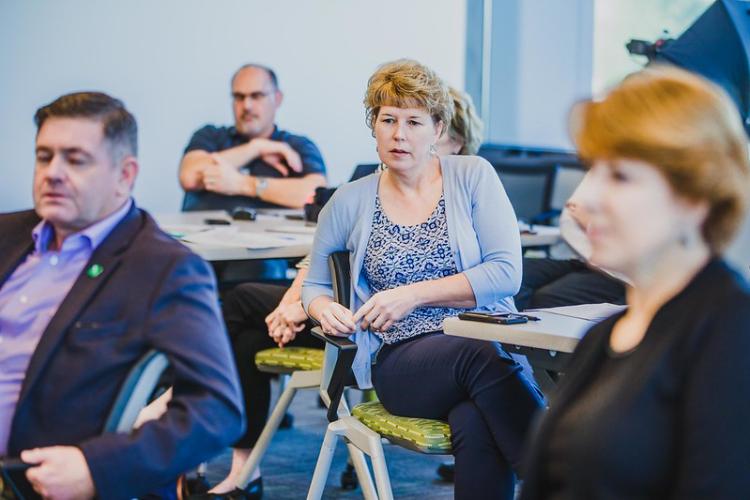
Voinovich Academy Lean Six Sigma Green Belt Certification Workshops Help Businesses Improve Problem Solving

Ohio University’s Voinovich Academy for Excellence in Public Service, a program of the Voinovich School of Leadership and Public Service, is helping organizations improve problem-solving through Lean Six Sigma Green Belt Certification. Brad Hollingsworth(opens in a new window), a Lean Six Sigma master black belt instructor, leads the trainings at the Voinovich Academy.
The Lean Six Sigma Green Belt Certification helps organizations and businesses in all industries deliver tangible results and enhance leadership through the Lean Six Sigma problem solving methodology, Hollingsworth said. Originating in manufacturing, the approach includes individuals at all levels within an organization and promotes work standardization to obtain bottom-line results and reduce organizational waste, he said.
“The big philosophical part of this methodology is including the people who actually do the work on the team, because they know the work the best,” Hollingsworth said. “Individuals with this certification will have the ability to coach these people and help them find the right solution.”
The Voinovich Academy began these workshops four years ago and completed its fifth cohort in August. The trainings, held virtually over the course of three months, serve as hands-on workshops for industry professionals to fix real, pressing issues in their organizations. During the first workshop, participants are tasked with brainstorming organizational problems to solve throughout the remaining trainings.
“Participants can expect to spend their time at the workshop working on a problem that is relevant to their organization,” Hollingsworth said. “We don’t use simulations or example exercises – it’s a hands-on learning environment with real world problems that is, ironically, held virtually.”
Although the Lean Six Sigma methodology originated in manufacturing, today Lean Six Sigma and the workshop are applicable and beneficial to a variety of industries including the public sector, service, business, public education, higher education and health care, Hollingsworth said. Some organizations that have participated in and benefited from the Voinovich Academy’s workshops include Columbus City Schools(opens in a new window), American Electric Power(opens in a new window), Licking County Health Department(opens in a new window), Muskingum Behavioral Health(opens in a new window) and American Regent(opens in a new window).
Angie Peters, an attendee of the Lean Six Sigma training, leads a team that manages customer accounts for American Electric Power. Reports submitted by her team for the accounts were often late or delayed, Peters said. At the workshops, she and her team strived to reduce the number of delays and, in turn, improve customer service. The team analyzed and improved the process to eliminate all delays for the following trimester.
“I now possess the ability to identify a problem, break it down, determine fundamental root causes and come up with a plan for action,” said Peters. “Yes, numbers tell a story showcasing black-and-white data, but so does the immeasurable result of strengthening relationships, team collaboration, improved productivity, organizational culture and employee engagement.”
Mason Brown, chief operating officer for Muskingum Behavior Health (MBH), also led a team through the trainings. The organization’s counselors are required to complete clinical documentation for each appointment, and MBH fell behind the industry standard, Brown said. During the training, he and his team created a flow chart of the process and discovered a redundant approval step, resulting in counselors waiting to start the documentation. The team streamlined the process and reduced time of documentation to meet the industry standard.
“We have already started using Lean Six Sigma. It’s been an enormous help with improving our clinical outcomes and improving access to our services,” Brown said. “It was the most impactful training I’ve ever been a part of, and I’m looking forward to what we can solve next.”
After five cohorts and various successes, Hollingsworth said he is excited for future cohorts, new experiences and the opportunity to help more organizations.
“Each cohort, we see participants guide a team to measurable results,” Hollingsworth said. “Lean Six Sigma is becoming part of these organizations’ cultures and will be used again and again into the future.”
